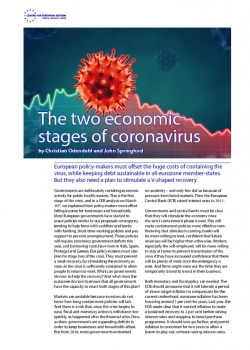
The two economic stages of coronavirus
European policy-makers must offset the huge costs of containing the virus, while keeping debt sustainable in all eurozone member-states. But they also need a plan to stimulate a V-shaped recovery.
Governments are deliberately curtailing economic activity for public health reasons. This is the first stage of the crisis, and in a CER analysis on March 10th, we explained how policy-makers must offset falling income for businesses and households. Most European governments have started to enact policies similar to our proposals: emergency lending to help firms with cashflow and banks with funding, short-time working policies and pay support to prevent unemployment. These policies will require enormous government deficits this year, and borrowing costs have risen in Italy, Spain, Portugal and Greece. But policy-makers must also plan for stage two of the crisis. They must prevent a weak recovery, by stimulating the economy as soon as the virus is sufficiently contained to allow people to return to work. What can governments do now to help the recovery? And what must the eurozone do now to ensure that all governments have the capacity to enact both stages of this plan?
Markets are unstable because investors do not know how long containment policies will last. And there is a risk that, once the crisis begins to ease, fiscal and monetary action is withdrawn too quickly, as happened after the financial crisis. Now, as then, governments are expanding deficits in order to keep businesses and households afloat. But from 2010, most governments embarked on austerity – and only few did so because of pressure from bond markets. Then the European Central Bank (ECB) raised interest rates in 2011.
Governments and central banks must be clear that they will stimulate the economy once the containment phase is lifted. This will make containment policies more effective now.
Governments and central banks must be clear that they will stimulate the economy once the strict containment phase is over. This will make containment policies more effective now. Knowing that stimulus is coming, banks will be more willing to lend, confident that future revenues will be higher than otherwise. Workers, especially the self-employed, will be more willing to stay at home to prevent transmission of the virus if they have increased confidence that there will be plenty of work once the emergency is over. And firms might even use the time they are temporarily closed to invest in their business.
Both monetary and fiscal policy are needed. The ECB should announce that it will tolerate a period of above-target inflation to compensate for the current undershoot: eurozone inflation has been hovering around 1 per cent for years. Last year, the ECB made clear that it wanted inflation to make a sustained recovery to 2 per cent before raising interest rates and stopping its bond purchase programme. It should now go further, and permit inflation to overshoot for two years to allow a boom to play out, without raising interest rates.
Fiscal policy should act on four fronts. Governments have provided loans to businesses to help them cope with falling revenues. But loans will raise debt burdens, which can curb investment. Governments should announce that part of these loans will be forgiven if the economy as a whole fails to make a strong recovery after the epidemic is contained. Companies should not be responsible for governments’ failure to overcome the virus and create the conditions for recovery. Governments should also legislate for generous tax relief for investment after the crisis through temporary tax credits.
The second front should be aid to the most affected services sectors. Here, the recovery will be weaker than in manufacturing: a cancelled restaurant visit, concert or holiday trip will rarely be rescheduled. To help raise demand, governments should announce today that these sectors will pay a lower VAT rate for a year, to boost consumption and activity (if prices are lowered in response) or repair balance sheets (if firms choose to use the tax cut to raise profits, and not lower prices). In 2009, the UK temporarily cut VAT, and the evidence suggests that 75 per cent of the cut was passed on to consumers.
The third front is consumption. Boosting consumer spending would help the most badly affected services sectors too. A one-time payment could be made as the pandemic eases, along the lines of the US’s 2008 ‘economic stimulus payments’ of around $300-600 per person. Research shows that consumers spent between 50 and 90 per cent of that money within three months of its disbursement. In countries like Germany that have a high tax burden on low incomes, permanent tax reductions on low incomes would be preferable, making work more attractive and expanding economic activity.
The final front is public investment. Many countries will have much higher public debt after the containment phase, and governments will be tempted to cut investment. Companies may anticipate that, and curb capacity now. If governments commit to a long-term programme of higher public investment after this crisis, firms dependent on public sector contracts will know that they can maintain – or even increase – capacity.
The eurozone’s fiscal hawks will argue, wrongly, that stimulus measures of this type make debt unsustainable. The ECB and the European Stability Mechanism (ESM), the eurozone’s bailout fund, have all the tools necessary to keep government borrowing costs down. On March 18th, the ECB announced €750 billion of new asset purchases, and, in a departure from usual practice, said they would be willing to buy more Italian assets, rather than buying from all countries in proportion to their ECB capital. This powerful commitment has eased tensions in markets.
European fiscal policy-makers should complement the ECB with collective action of their own. The ESM should help by providing bailout funds, with conditions to ensure spending is well-targeted on liquidity support to companies and wage support for workers. Ideally, this would be agreed for all eurozone member-states at once, rather than singling out Italy. A memorandum of understanding could make clear that the credit lines will only last for one year before having to be renewed. Policy-makers should also make clear that ESM funding will be increased if need be, through more joint borrowing by the member-states.
Of course, even well-designed stimulus programmes would raise public debt. But since they also increase economic activity, the crucial debt-to-GDP ratio may not increase much, or even fall. Monetary policy is currently weak because interest rates are near (or below) zero. In these conditions, deficit spending by governments tends to raise GDP faster than it raises public debt. This is particularly true if a pre-announced stimulus has positive economic effects during the epidemic, in reassuring businesses that revenues will be higher in the future, allowing them to pay for the loans taken on during the containment phase.
If Europe does not stand together, the consequences of the virus could be severe. Countries that fail to use fiscal policy to offset the deep recession will suffer permanent (and unnecessary) economic damage. In extremis, a renewed financial crisis in the eurozone would need to be contained, most likely through the ECB printing money and financing government deficits directly. Such a move is not as radical as it appears, since the economic hit from coronavirus will be severe but temporary, but it would almost certainly face fierce opposition in northern member-states. This virus is a very difficult test for the EU, but there is a broad expert consensus about the economics of the pandemic. And there will be no excuse if governments fail to act.
Christian Odendahl is chief economist and John Springford is deputy director at the Centre for European Reform.




Comments
Economic depression with mass unemployment encourages adhesion to populist extreme right parties. Mario Draghi warns: prevent return to situation of Europe in the 1920’s. Are fiscal hawk governments, negative to mutualising Cov-19 induced debt, oblivious of existential
threats?